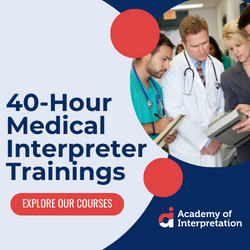This website uses cookies to store information on your computer to ensure you get the best experience using our website. By using the site, you consent to the placement of these cookies. Learn more.
Agree and dismissCOVID-19 Update
CCHI’s Comprehensive Approach to Mitigating the Pandemic’s Impact on CCHI Candidates and Certificants
May 20, 2020
Washington, DC
Certification Commission for Healthcare Interpreters
Over the past two months, CCHI, as every organization, has been grappling with the multi-layered impact the COVID-19 pandemic is having on our lives. Our main priority is supporting our certificants and candidates in upholding the national certification standards. We believe that certified interpreters provide an essential service. Ensuring quality of interpreting services remains crucial during the pandemic. The Commissioners deeply value the principles of fairness and inclusiveness and balance them with the commitment to the best testing practices and accreditation standards. While we cannot lower our standards, we are dedicated to making procedural adjustments that alleviate some of the burden for our candidates and certificants during these unprecedented times.
Our first step to help our candidates was to launch the online, at-home testing of the CoreCHI™ “written” exam (https://cchicertification.org/certifications/online-testing/).
Today, the CCHI Commissioners announce two new initiatives to mitigate the impact of the pandemic on our certificants and candidates.
1. CCHI temporarily reduces by 20% the certification renewal fee, for the duration of the pandemic. The new renewal fee is $240 (instead of $300).
This decision is retroactive as of March 1, 2020, i.e. the reduction is applicable to all those certificants who paid the renewal fee on and after 03/01/20. We will refund the difference within the next four weeks. (More info at https://cchicertification.org/renew-certification/renewal-process/application/) All certificants submitting their renewal applications now will see and pay the reduced fee as part of the regular process.
2. In view of the limitations imposed by complying with the testing center safety procedures due to the COVID-19 pandemic, the Commissioners implement temporary issuance of the Provisional CoreCHI™ Certificate to qualified CHI™ candidates of Arabic, Mandarin and Spanish.
This is a temporary change to the CHI™ certification policy; this is not a new credential. The CoreCHI™ certification has been a stand-alone certification, accredited by NCCA since 2014. The CoreCHI™ certification was not available to interpreters of Arabic, Mandarin and Spanish because these interpreters have to take and pass the oral performance exam in addition to the written knowledge exam. As of May 20, 2020, the Provisional CoreCHI™ Certificate (not language-specific) will be issued to those CHI™ candidates of Arabic, Mandarin and Spanish who:
- passed the CoreCHI™ exam after June 15, 2019 and
- have not taken the CHI™ exam as of 05/20/20.
Until the end of the COVID-19 pandemic (as determined by the federal government or re-opening of CHI™ test centers in all locations in the U.S. without any restrictions), this Provisional CoreCHI™ certification status will be considered the highest available to interpreters of Arabic, Mandarin and Spanish. (See full details at https://cchicertification.org/certifications/provisional/.)
We encourage each CHI™ candidate to evaluate their personal situation and make a responsible decision. The CHI™ testing will still take place during the scheduled testing windows (July 14 – Aug 11 and Oct 6 – Nov 3, 2020) in all locations in accordance with the state and local regulations (for current list of open test centers, click here). Qualified candidates can schedule their appointments for these testing windows at any time.
At the same time, we recognize that for many interpreters, during the rest of this year and possibly until the spring of 2021, the safest available option to confirm their qualifications will be taking a CoreCHI™ certification exam online, at-home, and receiving the Provisional CoreCHI™ Certificate. CCHI supports you in any decision you choose.
We thank you for your service, loyalty to CCHI, and dedication to the highest standards of the healthcare interpreting profession!
CCHI Commissioners
-
Resumption of Testing on May 1 & Launch of Online Testing of the CoreCHI™ exam (04/29/20)
April 29, 2020
Washington, DC
Certification Commission for Healthcare InterpretersCCHI and our testing company Prometric will be resuming testing in some locations, depending on the local situation, on May 1, 2020. The testing resumption is conducted with acknowledgement that healthcare interpreting constitutes an essential service during the pandemic.
Testing resumes for both the CoreCHI™ and CHI™ exams. We are updating the list of states and test sites in specific cities, which are open for business, on a daily basis. The test center status depends on the city, state and facility regulations and is outside of CCHI’s control. For OPEN TEST SITE LOCATIONS as of May 1, 2020, click here. For Prometric’s COVID-19 Updates, click here.
Your safety is our main priority. We encourage each candidate to make their decision carefully. CCHI has extended all qualified candidates’ CoreCHI™ exam eligibility until 12/31/20. Prometric waived their cancellation and rescheduling fees at this time. If you are looking to schedule a new appointment or reschedule the existing one, you can search for available appointments (only open locations will be displayed) at https://www.prometric.com/CCHI.
Prometric has implemented special safety procedures to ensure the protection of test takers and test center employees, and to remain in compliance with governmental mandates and recommendations from the CDC and WHO, including social distancing at six feet and requiring face masks.
At this time, the CHI™ Spring testing window will take place from May 1 until May 19. Because you will be wearing a face mask while recording your audio responses, please speak louder and speak clearly (enunciate).
Effective immediately, CCHI is launching the ONLINE “at-home” testing of the CoreCHI™ exam. For information about the “at-home” requirements and scheduling, visit our Online Testing webpage: click here.
The following sections outline these procedures (please note that these procedures will be subject to change as necessary):
1. Arrival and Check-In Procedures
Prior to entering the test center building, test takers will be required to do the following:
- Wear a mask during the entirety of their time at the test center. Test takers must have their own masks. Both medical masks and cloth face coverings are acceptable. Any test taker that comes to the test center WITHOUT a MASK will NOT be allowed to TEST, marked as a “no show,” and will not be eligible for a free reschedule. The test taker will have to pay the full exam fee again before they can re-schedule.
- Comply with any other local or federal mandates and guidelines.
- NOTE: DO NOT show up to the test center if – within the past 14 days, – you have been diagnosed with COVID-19, OR exposed to someone diagnosed with COVID-19, OR have returned from travel to a highly infected area, OR are experiencing flu or cold-like symptoms – to help ensure the safety of test center employees and other test takers. Instead, reschedule your exam on www.prometric.com/CCHI (rescheduling/cancellation fee is waived).
During the check-in process, all Prometric test center employees will:
- Wear masks, gloves, and have sanitizing materials at hand.
- Visually check the test taker’s glasses and ID (IDs with expiration dates from February 1, 2020 forward will be acceptable for testing).
- Require test takers to sign in on roster sheet with a Prometric-supplied pen. The pen will then be placed by the test taker into locker with personal belongings (or kept for the CHI™ oral exam along with scratch paper for use during the exam).
- Open the locker and then leave the area so that the test taker can enter and place belongings in the locker. When the test taker is clear of the area, the center staff will re-enter the area to secure the locker. The center staff will retain the key, and the locker area will remain under video surveillance while the center is open.
- NOTE: Three is the maximum number of test takers in the waiting area at any time.
2. Proctor & Testing Room Procedures
Prior to entering the proctoring room, the following modified processes will be enacted:
- Test takers will be required to stand on the ‘stand here’ sign or ‘X’ in place on the floor, designating a safe distance away from the test center employee.
- Test takers will be asked to show arms and ankles, as well as empty their pockets from the agreed safe distance area.
During the exam process, the following modified process will be enacted:
- Test takers will be seated with an open seat between each active workstation to ensure distancing guidelines are satisfied during testing.
3. End of Test Procedures
Once the exam is complete, the following modified processes will be enacted:
- Test takers will be asked to return to the reception area to take a seat.
- Test center employees will then:
- Confirm the name of the test taker and open the appropriate locker number. They will then leave the locker area so test takers can retrieve all of their belongings and return to their reception seat.
- Have the test taker to return to the reception desk to sign out with provided pen.
- If applicable, instruct test takers to provide all scratch paper and places them into a secure bin.
- Step away to allow test taker to sign out.
Final cleaning procedures will require:
- Test takers place their pen in a holding tub prior to leaving the facility.
- Test center staff use gloves to clean the used pens and put them back into circulation at the end of the day.
- Test center staff clean every workstation, admin desk, and proctor desk between each test taker, and at the start and end of each day.
- Test center staff to securely destroy all used scratch paper prior to leaving the test center.
Thank you for your understanding and support.
CCHI Commissioners
OPEN TEST SITE LOCATIONS as of May 1, 2020 (Test sites in cities and states that are not on the list are closed until 5/31/20 or further notice.): click here
-
Resumption of Testing On May 1, 2020 in Some Locations (04/23/20)
Resumption of Testing at Test Centers in the U.S. and Canada – Social Distancing & Safety Testing Procedures
April 23, 2020
Washington, DC
Certification Commission for Healthcare InterpretersCCHI and our testing company Prometric will be resuming testing in some locations, depending on the local situation, on May 1, 2020. The testing resumption is conducted with acknowledgement that healthcare interpreting constitutes an essential service during the pandemic.
We are working on the list of states and test sites in specific cities that we plan to re-open for the CoreCHI™ testing, first. As the situation is changing daily, we are working through the best time to release this information directly to qualified candidates. We will provide more details about re-opening of the CHI™ testing next week. For the up-to-date information regarding the test centers, please visit Prometric’s COVID-19 webpage regularly: click here.
Your safety is our main priority. We encourage each candidate to make their decision carefully. CCHI has extended all qualified candidates’ CoreCHI™ exam eligibility until 12/31/20. Prometric waived their cancellation and rescheduling fees at this time. If you are looking to schedule a new appointment or reschedule the existing one, you can search for available appointments (only open locations will be displayed) at https://www.prometric.com/CCHI.
Prometric has implemented special safety procedures to ensure the protection of test takers and test center employees, and to remain in compliance with governmental mandates and recommendations from the CDC and WHO, including social distancing at six feet and requiring face masks.
The following sections outline these procedures (please note that these procedures will be subject to change as necessary):
1. Arrival and Check-In Procedures
Prior to entering the test center building, test takers will be required to do the following:
- Wear a mask during the entirety of their time at the test center. Test takers must have their own masks. Both medical masks and cloth face coverings are acceptable. Any test taker that comes to the test center WITHOUT a MASK will NOT be allowed to TEST, marked as a “no show,” and will not be eligible for a free reschedule. The test taker will have to pay the full exam fee again before they can re-schedule.
- Comply with any other local or federal mandates and guidelines.
- NOTE: If you are sick or have been sick within the past two weeks, do not show up to the test center – to help ensure the safety of test center employees and other test takers. Instead, reschedule your exam on www.prometric.com/CCHI (rescheduling fee is waived).
During the check-in process, all Prometric test center employees will:
- Wear masks, gloves, and have sanitizing materials at hand.
- Visually check the test taker’s glasses and ID (IDs with expiration dates from February 1, 2020 forward will be acceptable for testing).
- Require test takers to sign in on roster sheet with a Prometric-supplied pen. The pen will then be placed by the test taker into locker with personal belongings (or kept for the CHI™ oral exam along with scratch paper for use during the exam).
- Open the locker and then leave the area so that the test taker can enter and place belongings in the locker. When the test taker is clear of the area, the center staff will re-enter the area to secure the locker. The center staff will retain the key, and the locker area will remain under video surveillance while the center is open.
- NOTE: Three is the maximum number of test takers in the waiting area at any time.
2. Proctor & Testing Room Procedures
Prior to entering the proctoring room, the following modified processes will be enacted:
- Test takers will be required to stand on the ‘stand here’ sign or ‘X’ in place on the floor, designating a safe distance away from the test center employee.
- Test takers will be asked to show arms and ankles, as well as empty their pockets from the agreed safe distance area.
During the exam process, the following modified process will be enacted:
- Test takers will be seated with an open seat between each active workstation to ensure distancing guidelines are satisfied during testing.
3. End of Test Procedures
Once the exam is complete, the following modified processes will be enacted:
- Test takers will be asked to return to the reception area to take a seat.
- Test center employees will then:
- Confirm the name of the test taker and open the appropriate locker number. They will then leave the locker area so test takers can retrieve all of their belongings and return to their reception seat.
- Have the test taker to return to the reception desk to sign out with provided pen.
- If applicable, instruct test takers to provide all scratch paper and places them into a secure bin.
- Step away to allow test taker to sign out.
Final cleaning procedures will require:
- Test takers place their pen in a holding tub prior to leaving the facility.
- Test center staff use gloves to clean the used pens and put them back into circulation at the end of the day.
- Test center staff clean every workstation, admin desk, and proctor desk between each test taker, and at the start and end of each day.
- Test center staff to securely destroy all used scratch paper prior to leaving the test center.
REMINDER: CCHI and Prometric are preparing to launch the ONLINE “at-home” testing of the CoreCHI™ exam by early May. For information about the “at-home” setting requirements and computer/internet specifications, visit our new Online Testing webpage: click here. All eligible candidates will receive an email with detailed instructions as soon as we are ready to launch.
Thank you for your understanding and support.
CCHI Commissioners
-
Testing Process during the COVID-19 Pandemic (04/16/20)
Our testing company, Prometric extended the closure of all test centers in the United States and Canada, which started on 3/18/20, until May 1, 2020. This step is necessary in order to comply with the federal and state COVID-19 guidance as well as to further protect the health and well-being of you – our test candidates – and the staff at our test centers. At this time, Prometric anticipates re-opening test centers on May 1; however, the specific date will depend on circumstances that are changing daily.
We all know that everyone must adjust their protocols and processes for this new reality.
So have we…
CCHI has successfully petitioned the National Commission for Certifying Agencies (NCCA), our accrediting body, to allow us to test candidates remotely. NCCA has granted us temporary permission to administer the CoreCHI™ “written” exam online. However, CCHI will not be able to offer the CHI™ performance exam remotely without violating our national accreditation due to the nature and specific parameters (e.g. audio capture, allowing notetaking) of that exam.
NCCA’s permission to allow online “at-home” testing for multiple-choice exams is temporary until they are able to confirm the validity of remote testing. We expect their final decision on this issue in June.
CCHI and Prometric are preparing to launch the online “at-home” testing of the CoreCHI™ exam within a couple of weeks. We will provide all specifications (e.g., a laptop or desktop with a webcam is required; wired internet connection is highly recommended, etc.), a demo video, and a special online scheduling link. All eligible candidates will receive an email with complete instructions and links.
This is the time for all interpreters who have thought about certification but have not started the process to take this exam. This is a unique opportunity to take the CoreCHI™ exam in the privacy of your home! You can start preparing now by reviewing the CCHI Candidate’s Examination Handbook (at no cost) or taking our Practice CoreCHI™ exam ($30, click here to learn more).
We encourage everyone to take advantage of your downtime to prepare yourself professionally for the end of the COVID-19 pandemic. We expect many patients will return to seek health care that was delayed due to this crisis, and there may be a large backlog of healthcare interpreting demand.
We thank you for your service and dedication to the healthcare interpreting profession!
CCHI Commissioners
-
Open Letter on Ensuring Healthcare Interpreters’ Safety during the COVID-19 Pandemic (04/03/20)
Open Letter on Ensuring Healthcare Interpreters’ Safety during the COVID-19 Pandemic
April 3, 2020
Delivered via emailNational Governors Association
Maryland Governor Larry Hogan, ChairAmerican Hospital Association
Richard J. (Rick) Pollack, President and Chief Executive OfficerAmerican Medical Association
Dr. Patrice A. Harris, PresidentAmerican Nurses Association
Ernest J. Grant, PhD, RN, FAAN, PresidentAmerica’s Essential Hospitals
Bruce Siegel, MD, MPH, President and CEOCatholic Health Association
Sr. Mary Haddad, RSM, President & Chief Executive OfficerFederation of American Hospitals
Charles N. Kahn III (Chip), President & Chief Executive OfficerDear colleagues,
We, the undersigned representatives of the healthcare interpreter profession, are deeply concerned about the safety of healthcare interpreters, language access services for patients with limited English proficiency (LEP) and their families, and safety of all healthcare workers during this pandemic.
We understand that many hospitals and healthcare systems in the U.S. are doing their best to re-think the logistics of providing health care and to allocate all resources efficiently and effectively. The current situation is unprecedented in our lifetimes. Safety of all healthcare workers with direct patient contact must be our number one priority. This includes physicians, nurses, allied professionals, and face-to-face/onsite healthcare interpreters whether or not they have been diagnosed with COVID-19 or are potentially COVID-19-positive.
We advise healthcare administrators and managers that face-to-face/onsite healthcare interpreters should be provided the same level of protection and use of personal protective equipment (PPE) as any healthcare provider for whom they are interpreting. We recognize that the PPE shortage may necessitate certain limiting measures in some facilities and locations. It is extremely important for managers to have transparent and honest conversations with interpreters and collectively come to an understanding when and to whom PPE is provided.
Ultimately, if appropriate PPE is not available for an interpreter, then alternatives to face-to-face/onsite interpreting MUST be provided to both reduce the spread of the coronavirus by interpreters and ensure their personal safety. Unlike most healthcare providers, interpreters work in different departments, different facilities, and even different campuses throughout the day. Their inadequate protection will result in spreading the virus not only in the community and to their families, but also to other healthcare workers and patients within and outside a specific facility.
We recommend all hospitals, health systems, clinics, and healthcare providers deploy Remote Interpreting (RI) for most of their interactions with LEP patients and their families, as the primary modality for delivery of language access services in the time of this pandemic. We understand that implementation of RI cannot happen overnight and may require certain IT solutions as well as evaluation for compliance with laws and regulations. However, implementing RI will allow facilities to reserve much needed PPE for healthcare professionals who must be in direct contact with patients. Furthermore, face-to-face interpreters have a higher risk of becoming a vector of infection even with the appropriate use of PPE due to the mobility of their job.
In situations when institutions are utilizing telemedicine/telehealth options for providing care, they need to incorporate RI into these solutions to ensure equal access to health care for LEP patients.
Remote Interpreting may be implemented in the following ways:
- Creating in-house RI call centers from where current staff interpreters interpret remotely via video or phone. In such call centers, proper distancing and cleaning protocols must be enforced to ensure safety of interpreters.
- Equipping current staff interpreters with tools to interpret from home via a video application or phone.
- Expanding utilization of, or contracting with, language service companies providing RI as part of their business model.
Regardless of the method chosen, the facility must ensure that LEP patients are placed into rooms that have access to a phone or video device (tablet, computer monitor, TV screen) connected to the internet.
It is also important to keep in mind that the steps we are taking in these extraordinary times do not negate the need for face-to-face interpreting modality overall, as this modality is crucial when interpreting for hard-of-hearing patients, patients with dementia, deafblind patients, young children, etc.
We encourage all interpreters to work closely with their management to help ensure the safety of everyone and to continue to provide equal access to health care for LEP patients.
Together we will persevere. Thank you for your service!
Respectfully submitted on behalf of the following organizations:
Certification Commission for Healthcare Interpreters (www.cchicertification.org)
American Translators Association (www.atanet.org)
California Healthcare Interpreting Association (www.chiaonline.org)
InterpretAmerica (www.interpretamerica.com)
Joint National Committee for Languages (www.languagepolicy.org)
National Council on Interpreting in Health Care (www.ncihc.org)
Texas Association of Healthcare Interpreters and Translators (www.tahit.us) -
CCHI’s Statement on Ensuring Healthcare Interpreters’ Safety during the COVID-19 Pandemic (03/25/20)
March 25, 2020
Washington, DC
Certification Commission for Healthcare InterpretersThe Certification Commission for Healthcare Interpreters (CCHI) is deeply concerned about the safety of healthcare interpreters, language access services for patients with limited English proficiency (LEP) and their families, and safety of all healthcare workers during this pandemic.
We understand that many hospitals and healthcare systems in the U.S. are doing their best to re-think the logistics of providing health care and to allocate all resources efficiently and effectively. The current situation is unprecedented in our lifetimes. Safety of all healthcare workers with direct patient contact must be our number one priority. This includes physicians, nurses, allied professionals, and face-to-face/onsite healthcare interpreters whether or not they have been diagnosed with COVID-19 or are potentially COVID-19-positive.
The Commissioners advise healthcare administrators and managers that face-to-face/onsite healthcare interpreters should be provided the same level of protection and use of personal protective equipment (PPE) as any healthcare provider for whom they are interpreting. We recognize that the PPE shortage may necessitate certain limiting measures in some facilities and locations. It is extremely important for managers to have transparent and honest conversations with interpreters and collectively come to an understanding when and to whom PPE is provided.
Ultimately, if appropriate PPE is not available for an interpreter, then alternatives to face-to-face/onsite interpreting MUST be provided to both reduce the spread of the coronavirus by interpreters and ensure their personal safety. Unlike most healthcare providers, interpreters work in different departments, different facilities, and even different campuses throughout the day. Their inadequate protection will result in spreading the virus not only in the community and to their families, but also to other healthcare workers and patients within and outside a specific facility.
CCHI recommends all hospitals, health systems, clinics, and healthcare providers deploy Remote Interpreting (RI) for most of their interactions with LEP patients and their families, as the primary modality for delivery of language access services in the time of this pandemic. We understand that implementation of RI cannot happen overnight and may require certain IT solutions as well as evaluation for compliance with laws and regulations. However, implementing RI will allow facilities to reserve much needed PPE for healthcare professionals who must be in direct contact with patients. Furthermore, face-to-face interpreters have a higher risk of becoming a vector of infection even with the appropriate use of PPE due to the mobility of their job.
In situations when institutions are utilizing telemedicine/telehealth options for providing care, they need to incorporate RI into these solutions to ensure equal access to health care for LEP patients.
Remote Interpreting may be implemented in the following ways:
- Creating in-house RI call centers from where current staff interpreters interpret remotely via video or phone. In such call centers, proper distancing and cleaning protocols must be enforced to ensure safety of interpreters.
- Equipping current staff interpreters with tools to interpret from home via a video application or phone.
- Expanding utilization of, or contracting with, language service companies providing RI as part of their business model.
Regardless of the method chosen, the facility must ensure that LEP patients are placed into rooms that have access to a phone or video device (tablet, computer monitor, TV screen) connected to the internet.
CCHI also encourages all interpreters to closely work with their management to help ensure safety of everyone and continued equal access to health care for LEP patients. Together we will persevere. Thank you for your service!
CCHI Commissioners
-
Testing Update on March 17, 2020
March 17, 2020
Washington, DCDear certified interpreters, candidates, and all of our stakeholders,
Within the past 24 hours, the US Centers for Disease Control (CDC) have issued updated guidance on measures to be taken to reduce the spread of the COVID-19 disease. In particular, the CDC lowered the number of people that should be able to congregate in the same space to 10.
Given this new guidance, Prometric has determined it is necessary and appropriate to close the test centers in the United States and Canada for a period of 30 days, starting March 18. This dramatic step is necessary in order to comply with this new federal guidance as well as to further protect the health and well-being of the candidates and the staff that provide services at each of the testing locations.
Prometric operations teams are actively reaching out to candidates with testing appointments today and throughout the closure period, in an effort to prevent them from unnecessarily appearing at the testing centers. Prometric’s staff will be rescheduling those impacted appointments into a new date after the planned re-opening and will be communicating that information to the impacted candidates. Prometric will be waiving any rescheduling fees.
At this time, Prometric anticipates re-opening test centers for the CoreCHI™ “written” exams on April 16, however, please note that the specific date will depend on circumstances that are changing daily. All CCHI candidates are getting an automatic eligibility extension until 12/31/20.
CCHI will assess the situation on April 16 and will advise all eligible candidates if the CHI™ oral exam testing will start on April 21 as has been planned earlier. At that time, we will also inform everyone about the ETOE Study status.
CCHI is in conversation with our accrediting body NCCA to allow us an emergency testing at-home (remote) for the CoreCHI™ exams. At-home testing currently does not meet accreditation standards, so we cannot start it at our own. We will keep you updated about this situation.
Thank you for your support and continued loyalty as we work together to ensure the safety, health and well-being of each other and those we serve.
Please don’t hesitate to reach out to us at info@cchicertification.org.
CCHI Commissioners and staff
-
Update of March 10, 2020
March 10, 2020
Washington, DCDear certified interpreters, candidates, and all of our stakeholders,
We at CCHI are thinking of you. Many of you are on the front lines of the COVID-19 epidemic, and we are deeply grateful for your efforts towards keeping our communities healthy.
We are going through challenging times as a country. At this moment, we can’t predict the full impact of the COVID-19 pandemic in our country and on healthcare system. Please follow universal precautions and disinfection guidelines from your workplaces, local authorities, and the CDC. Measures taken by the individuals such as hand washing and social distancing can have tremendously positive effect on our communities.
Our testing vendor, Prometric, is taking all the necessary precautionary measures and will institute test center closures based on the local situation. All high-touch surfaces are cleaned after each exam by the test center staff. Candidates are also provided with disposable disinfectant wipes if they wish to additionally wipe common surfaces.
You can find more information about Prometric’s test center procedures here: https://www.prometric.com/corona-virus-update.
Thank you for your understanding and support.
CCHI Commissioners and staff




















